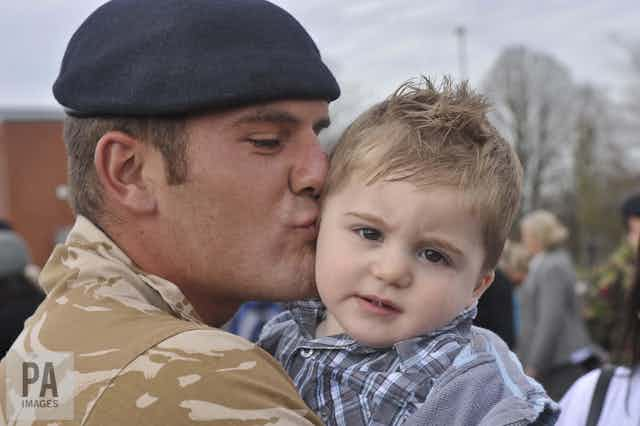Partners of people in the armed forces can feel alienated by stereotypical ideas and notions about what it is like to serve in the military. The “he/she knew what they were signing up for” response is all too common. My research looked at what British army partners go through when spouses return from deployment. It has revealed they often feel misunderstood, uncomfortable and frustrated in non-military company.
Due to changes being made to the military family housing model and personal drives to protect the family from regular relocations, army families are now more likely to be living away from bases and alongside civilians. Therefore, the public needs to be educated about the realities of military life – for soldiers and partners alike.
The current model of the military community is built around the military base. Personnel can live on or near to their duty station, with their families, in Service Families Accommodation. By living in close proximity, military families develop deep connections with one another. However, the proportion of army families living in this type of accommodation during the working week has decreased from 76% in 2010 to 68% in 2017.

Generally, army families choose to live away from bases to protect the career and education of non-serving members from relocations (army families move every two to three years) and to live close to the wider family. Additionally, the introduction of the Future Accommodation Model over the coming years will likely lead to more families living off-base, alongside civilians. The model aims to increase the variety of accommodation by offering military families financial subsidies to rent in the private sector.
However, my research has found that army partners often feel misunderstood by the civilian community. Separation from a community that understands and immersion into a community that does not is problematic as research suggests army partners and personnel rely primarily on friends and family for support.
Alienation and stigma
Relationships with civilians are complex but army partners regularly report feeling alienated during interaction. In my interviews, army partners regularly recount that when “opening up” about military-related stress, they can be met with indifference by civilian friends and colleagues. They are told “He knew what he was signing up for” and “You made your bed, now lie in it”. These sentiments echo Congresswoman Frederica Wilson’s accusation that President Donald Trump told recently widowed Myeshia Johnson that “He knew what he was signing up for, but I guess it hurts anyway”.
Army partners tire of explaining themselves, especially when met with ambivalence from civilians who lack understanding about wider implications. In talking about her experiences before the return of her partner from deployment, one partner said:
They can be coming home in two weeks and you can phone up and have a complete meltdown to military friends and sob and sob and sob, and just say I feel miserable today, I’ve just had enough. Whereas someone else will say, ‘Oh, they’re coming home in two weeks, you must be happy’.
The return of the soldier is not a return to stability – relationship building is necessary and redeployment is always on the horizon.
Another army partner said her civilian friends have the same level of understanding as her toddler. It was also reported that civilians compare deployment to shorter separations like work conferences – disregarding risk to life and that deployments are lengthy. Some army partners also felt that civilians unfairly stigmatised the military community for being unruly and aggressive.
Disregard and ambivalence alienates army partners from the wider community and makes it difficult for them to seek support. As more military families are expected to live among the civilian community, it is essential that understanding of serving families’ daily realities are developed. Civilians need to learn to empathise and not to pity to ensure military partners do not become isolated members of our communities.

